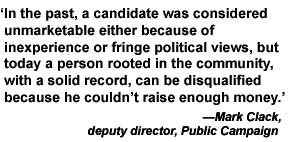By Richard Muhammad
- The Color of Money Project
- Black politics 2003: Growing numbers, declining influence? (FCN, 10/10/2003)

(FinalCall.com) – America’s most famous zip code may be 90210, but even ritzy Beverly Hills can’t match 10021 when it comes to political clout.
Zip code 10021 covers the Upper East Side of Manhattan, where overwhelming rich, powerful White donors gave $28.4 million in individual contributions to candidates in the last round of federal elections.
That’s more money than all individual donations from 532 zip codes nationally that represent 7.6 million Blacks, or 84 times the number of people who live in 10021, according to a recent report.
The racial divide when it comes to donors is so wide that Blacks and Latinos might as well be poor sharecroppers locked out of voting booths by poll taxes and literacy tests, said Stephanie Wilson, executive director of the Fannie Lou Hamer Project, a non-profit group devoted to campaign finance reform and political empowerment for minority groups.

“Today, people of color are excluded from access and influence as effectively as if Congress re-enacted a poll tax charging people for the right to vote,” according to The Color of Money Project, which mapped the 25 top metro areas for political contributions by zip code. It found that $9 out of $10 in political offerings by individuals came largely from areas where people of color do not live.
The authors of the study argue comprehensive reform of campaign financing is needed.
“If you’re not giving your legislator any money, your legislator is not obligated to give you anything in return,” said Ms. Wilson, whose group signed on to the Color of Money report.
Checking political donations to political candidates must be part of efforts to make sure Black and minority voices are heard in elections, she said, adding that it is just as important as making sure poor and minority districts have voting machines that work and polling places that open on time.
According to the Color of Money Project, in 2002 elections, House candidates who outspent opponents won 94 percent of the time. Even in open-seat races, in which no candidate had an incumbent advantage, the top spender won 79 percent of the time in House races, according to the Center for Responsive Politics. Spending, in fact, is rarely even close. In two-thirds of House races in 2002, winning candidates outspent losing candidates by a factor of 10 to 1 or more.
Furthermore, the amount of money required to succeed is enormous. In 2002, Senate candidates spent an average of $4.8 million and House candidates, nearly $900,000.
The donor base is also overwhelmingly White although the U.S. population grows more racially diverse: nearly one out of three Americans is non-White.
“There is no more passing the mayonnaise jar around the community center to raise money for a campaign,” said Mark Clack, deputy director of Public Campaign, a campaign finance reform group that oversaw compilation of the Color of Money report.
The cost of running in every campaign cycle at just about all levels is going up, candidates have to pay for TV time and high power consultants and neither comes cheaply, he noted. So, wealthy people have access to lawmakers and potential lawmakers and ordinary people do not, he continued.
In the past, a candidate was considered unmarketable either because of inexperience or fringe political views, but today a person rooted in the community, with a solid record, can be disqualified because he couldn’t raise enough money, Mr. Clack explained.
Money-raising doesn’t end with a successful campaign. Politicians spend 50 to 60 percent of their time chasing campaign money, he said.
He should know. He is a former congressional aide to Mr. Mfume, the one-time Congressional Black Caucus chairman and current NAACP president. He recalls running to Democratic National Committee offices during lunch breaks and pushing the congressman to help raise money.
From Rev. Jesse Jackson’s presidential campaigns of the 1980s to the current White House bids by Rev. Al Sharpton and former Sen. Carol Moseley-Braun, a lack of money is a major obstacle for Black candidates.
Rev. Sharpton may be the most articulate, the most energetic and more willing to speak about class, race and poverty, but he has raised little money, Mr. Clack said. Ms. Braun has decent name recognition, but money from political progressives is being siphoned off by fellow White House hopeful Dennis Kucinich (D-Ohio), he said. That leaves Rev. Sharpton and Ms. Braun vying for the same, small donor base, he said.
But if Black office seekers have to worry about money, outspoken incumbents can be just as vulnerable. A green wave of political contributions from outside of a congressional district can easily sweep a Black lawmaker from office.
The 2002 defeats of incumbents Cynthia McKinney of Georgia and Rep. Earl Hilliard of Alabama are prime cases.
With their challengers buoyed by campaign donations from outsiders, both incumbents were unseated. Georgia’s open primary, which allowed Republicans to vote for Rep. McKinney’s opponent in the Democratic primary election in Georgia’s Fourth Congressional District, and the surprising strength of Rep. Hilliard’s opponent were factors–but the power of out of district dollars was undeniable.
“The money flowed in and they (McKinney and Hilliard) were helpless in the face of it,” said one veteran political observer. “That’s a very corrupting influence that made us look lousy as a community.”
It was a way to replace “troublesome” lawmakers with handpicked Black leaders, he said. Both Reps. McKinney and Hilliard were critical of Israel. Arab Americans donated to both campaigns, while supporters of the Jewish state donated heavily to the opponents. The donations from pro-Israel forces were much higher and the Arab American money was tainted by charges it came from terrorist sympathizers.
Rep. McKinney was also blasted by the media for support offered by Minister Louis Farrakhan of the Nation of Islam, and for asking questions about what the federal government knew before Sept. 11, 2001 attacks on the World Trade Center. Post-election analysts argued she was “too radical” for a district whose priorities had changed.
Rep. Hilliard was blasted for taking a trip to Libya and, in post-election analysis, was charged with ethics lapses and bringing too little back to his district.
But in news dispatches during the 2002 election, including a BlackElectorate.Com note about a Wall Street Journal article, Federal Election Commission reports showed that, between April 1 and May 20, Artur Davis, Rep. Hilliard’s opponent, raised $360,636. Seventy-five percent of the donations came from New York City and pro-Israel groups hosted numerous Davis fundraisers, according to BlackElectorate.Com.
Mr. Hilliard lost a June 25, 2002 run-off with Mr. Davis, a Black former federal prosecutor. Later that summer, Ms. McKinney was defeated by Denise Majette, a Black ex-judge.
“We don’t talk about campaign finance reform enough,” said Ray Winbush, director of the Institute for Urban Research at Morgan State University. Black candidates usually don’t have money and rely on a “movement” sentiment to drive campaigns, he noted.
In the context of the McKinney-Hilliard defeats, campaign finance reform is very important because the scenario could be repeated anywhere, he said. Though there were other problems, like the Democratic National Committee’s lack of support for Ms. McKinney, the outside money sank her, he added.
He also offered another lesson about the power of money. Mr. Winbush supported Harvey Gantt, a Black Democrat, over legendary Republican race baiter Senator Jesse Helms in North Carolina in 1990. Late in the tight election, Sen. Helms put out a now notorious TV ad. White hands crumpled a rejection letter as a background voice said: “You needed that job and you were the best qualified. But they had to give it to a minority because of a racial quota.” The ad played on fear and put Sen. Helms over the top.
Mr. Winbush believes that, if the Gantt campaign had had another $100,000, it might have beaten back the racial salvo with counter television ads.
However, he isn’t sure if Blacks have learned lessons about money and politics and concedes campaign finance reform can be tough to explain. The Black church, a force in Black politics, fears political fundraising may threaten non-profit status, he explained. Churches must be non-partisan or risk losing federal dollars that pay for services like church-run day care and drug treatment centers.
While Mr. Winbush believes Black politicians need to talk more about campaign finance reform and that political action committees (PAC) could help, Mr. Clack doubts both approaches. Expect lip service on the need for reform, but actual change isn’t imminent, he observed.
“If you can’t raise $10 million, your PAC isn’t going to be able to do much,” Mr. Clack said, adding that solicitations for PAC money will go to the same people hit up for $2,000 donations.
“The system is less and less democratic and by, for and of the people who can pay for it,” Mr. Clack said.












